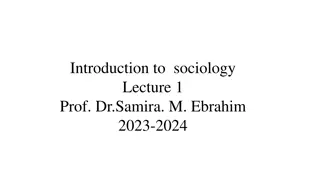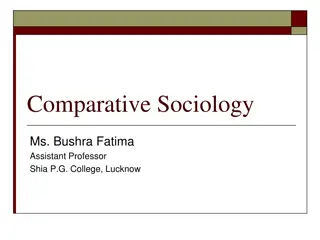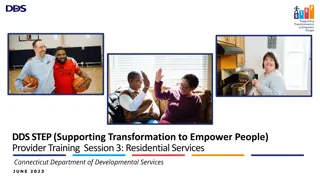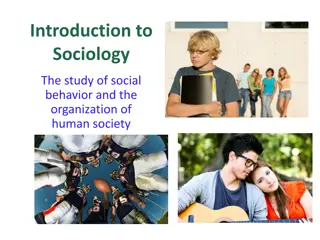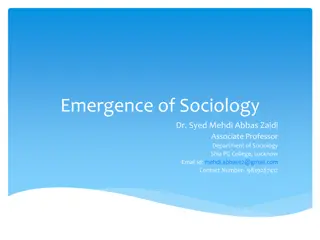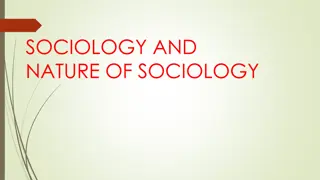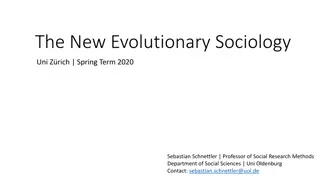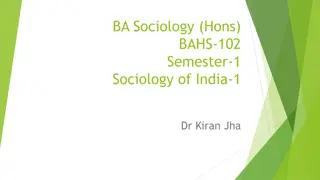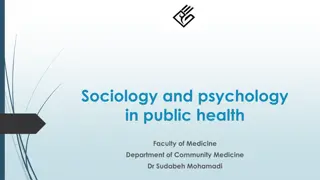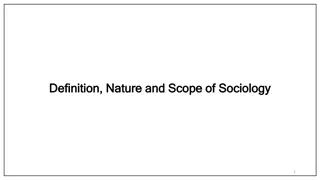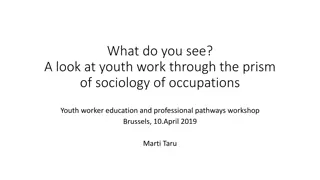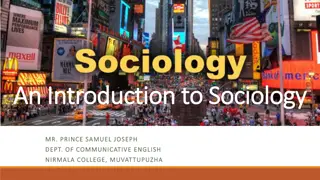Step Up to Sociology: Summer Transition Work at Stepney All Saints
Delve into key sociology concepts like socialisation, culture, and identity, through a series of tasks and analyses. Explore topics such as nature vs. nurture, cultural diversity, and the impact of consumption on identity. Prepare for OCR exam papers and develop a deeper understanding of A-level Sociology.
Download Presentation

Please find below an Image/Link to download the presentation.
The content on the website is provided AS IS for your information and personal use only. It may not be sold, licensed, or shared on other websites without obtaining consent from the author.If you encounter any issues during the download, it is possible that the publisher has removed the file from their server.
You are allowed to download the files provided on this website for personal or commercial use, subject to the condition that they are used lawfully. All files are the property of their respective owners.
The content on the website is provided AS IS for your information and personal use only. It may not be sold, licensed, or shared on other websites without obtaining consent from the author.
E N D
Presentation Transcript
Step Up to Sociology A Level at Stepney All Saints SOCIOLOGY SUMMER TRANSITION WORK
Step Up to Sociology A Level Exam Board: OCR Exam papers: You will sit 3 exam papers at the end of year 13. Below is a detailed plan of how you will be assessed.
Tasks: On the following slides you will have a number of tasks to complete. The tasks give you an insight into the key topics we will explore in A- level Sociology.
Socialisation, culture and Identity- Key terms Define the following concepts and illustrate with examples; (You can use the internet to help you) 1. Norms 2. Values 3. Socialisation 4. Primary socialisation 5. Secondary socialisation 6. Agents of socialisation 7. Identity 8. Social control Recap on year 11
Socialisation, culture and Identity-Key terms Briefly define the following terms and give an example of each; (You can use the internet to help you) Culture Subculture Cultural diversity Cultural hybridity High culture Popular culture Consumer culture Global culture
Socialisation and Identity how do we learn human behaviour? Watch the following clip; https://www.youtube.com/watch?v=K0Zs-Ic0t9w 1. Do some research on the internet to find out what the nature/nurture debate is. Sociologists believe that human behaviour is taught rather then inherent and therefore support the nurture theory. 2. While you watch the clip consider whether human behaviour is influenced by our biology or by our surroundings? Can you find examples of both? 3. Once you have collected your evidence consider how you would address this claim in light of the evidence collected. Provide one argument for and one argument against. Human behaviour is shaped more by our surroundings not by our biological disposition .
Culture and Identity Analysis task Research the following terms; consumption, globalisation and cross cultural. Sociologists recognise that our culture today is based around consumption and materialism. To understand this better consider the following questions: Questions: 1. How important are the things that you buy to your life? 2. How do they shape your identity? 3. Research the study by Leavis on consumer culture what did he argue about the key features of this culture? An important part of consumer culture is the availability of products and goods globally. 1. Suggest examples of globalisation in action i.e. things that have become cross-cultural. Which technological developments have added to the process of globalisation? How does globalisation strengthen the consumer culture? 2. Consider the positive and negative effects on individual cultures of such developments.
Socialisation, culture and Identity Read the following article Our lives are becoming hopelessly Americanised, says Professor Halsey Life in Britain can no longer be said to be uniquely British, a leading social scientist declares. Growing international homogeneity and the dominance of American culture mean that it is increasingly difficult to pinpoint Britishness, according to the sociologist A.H.Halsey. He suggests that Britain has lost the distinctiveness it had when he was a child, and that our lives are becoming Americanised to the point that life in Britain can no longer be said to be uniquely British. (Adapted from Brindle 2000)
Socialisation, culture and Identity 1. What is meant by the term homogeneity? 2. Do you agree that our lives have become Americanised? 3. Can you provide examples in modern society that supports the idea that our lives have become Americanised? How much of American culture is embedded in your own life? Explain your answer Bigger picture: Consider why some may feel that this process has threatened cultural diversity.
Family: Research task: Define the family type. Has the family type increased or decreased in contemporary society? Identify key trends (use the internet to find statistical data) Identify reasons for the increase or decrease. Create a fact sheet on each type of family. 1. 2. 3. 4. 5. 6. 7. 8. Nuclear family Extended family Lone parent family Reconstituted family Same sex family Non family households Living alone Living apart together Watch the clip https://www.youtube.com/watch?v=VRwKlvcWE3E What are the findings from the clip. Explain how the findings challenge traditional gender roles within the family.
Family: Research task: Watch the following clips; The British Family https://www.youtube.com/watch?v=fI40wizRNc4 (Part 1) https://www.youtube.com/watch?v=X0nOz1WFyJE (Part 2) https://www.youtube.com/watch?v=atykiYfMzjI (Part 3) https://www.youtube.com/watch?v=nQt8Z_Y-6OI (Part 4) Explain how the role of children, parents and the elderly have changed in the family. Discuss the following question in light of evidence found: Is the family a happy place for everyone? Refer to the video clips to support your points.
Social Inequality What is the relationship between gender and inequality? Then use the internet to find evidence to support the idea that women experience disadvantages in each area. You can include sociologists, trends, real life stories and articles. You can type your evidence on a word document.
Research: What measures have been taken to tackle inequality? Now you will begin to analyse and evaluate, have these measures worked? If so how effective have they been? If not, why not?
Social Inequality Challenge task: Using the internet find out Marxist view on social class. What is the relationship between class and inequality? Explain how Marxist will view social inequalities. Poor Kids: Life on the breadline Watch the clip below; https://www.youtube.com/watch?v=i9aSp9bFmMg Using this clip, analyse how an individual s social class may be a factor in creating inequalities? Discuss in detail and use examples from the clip to support your answer.
Digital Forms of Communication Look at the image; provide a definition for digital forms of communication. Watch the following clip on YouTube: Catfish: The TV show Trailer. Consider your use of social media; do you use this to make new friends, maintain existing relation ships? Does it serve any other purpose e.g. shopping, gaming etc? Analyse the impact of digital forms of communication on our identities and relationships? Do you think relationships have become stronger or weaker because of it? Explain your answer Digital forms of communication are negative for society Do you agreed with this statement? FOR AGAINST Fill in the table
Education What is the relationship between ethnicity and educational achievement? What do the statistics show in regard to exam success and ethnicity?
Education What explanations have been put forward to explain differential educational attainment between different ethnic groups? Watch the following clip on YouTube called; Teacher TV: Black Boys Brainstorm all the reasons why black boys are underperforming? https://www.youtube.com/watch?v=n0UI-sqA_z0 Using the internet find the key trends on educational achievement for ethnic minorities and gender (must be recent data). Explain your findings. Evaluate the explanations you have found. What are the strengths and weaknesses of the explanations provided on differences in attainment levels between different students? Explanations
A Level- Research Methods Research methods are all about what sociologists do. Many sociological theories are underpinned by evidence. Evidence has to be collected from the social world around us and this requires empirical research to be done. Empirical simply means based on evidence from the real world . The process of carrying out research and collecting evidence distinguishes sociologists from those who make claims about society based on common-sense opinions, personal experiences or prejudices
Activity Researching violent crime Ask 2 people you know, whether violent crime has increased in the last ten years. Next, ask them where they have got their evidence from. Is their evidence based on research findings, or personal opinion? Official crime statistics states that the overall level of gun crime in England and Wales is very low less than 0.5% of all crime recorded by the police and the number of overall offences involving firearms fell by 2% in 2007-08 compared to the previous year. Does this finding differ from the perception of your friends/family? Why do you think this might be? Investigate where official crime statistics, such as the ones above, come from. Can you see any problems with this as evidence? What is missing from this data? Watch the following clip; https://www.youtube.com/watch?v=jzdTiM5wS_c - Answer the following questions: What is the dark figure of crime? How reliable are official crime statistics?
Tasks: Types of data primary and secondary Primary data is information collected by sociologists themselves for their own purpose. These purposes may be to obtain a first-hand picture of a group or society, or to test a hypothesis (an untested theory). Task ? Write down 3 methods which could be used to gather primary data ?
Secondary data is information that has been collected or created by someone else for their own purposes, but which the sociologist can then use. Task ? Write down 2 methods which could be used to gather secondary data ?
Evaluation Task ? ? Complete the following table. Some of the advantages and disadvantages have been completed for you. Use the internet to help you complete the task. Primary data The data is very contemporary and up to date Secondary data It s a quick and cheap way of doing research. Advantages It may not provide the exact data Disadvantages
Factors influencing choice of method: PET Given the wide range of methods available, sociologists need to select the right one for their research. Different methods and sources of data have different strengths and limitations in terms of practical, ethical (moral) and theoretical issues. Task ? practical, ethical and theoretical issues which influence a choice of research method ? Use the Internet, complete the boxes on the following slide, summarising the different
Evaluation Concepts: Practical issues Time and money Funding bodies Personal skills & characteristics Subject matter Research opportunity Access & safety of the researcher Ethical issues Informed consent Confidentiality & privacy Effects on research participants Vulnerable groups Covert research & deception Which do you think is the most important factor? Why?
Research in action: Watch the following clips https://www.youtube.com/watch?v=yAkDHuimJRc https://www.youtube.com/watch?v=Lp5twji3pk8 Answer the following questions: 1. What methods were used? 2. Identify the ethical issues that were broken in this piece of research. 3. Identify and explain what the researcher did to overcome breaking the ethical issues. 4. Do you think researchers should be allowed to break ethical guidelines for the purpose of research? Watch this panorama documentary on abuse in care home. Analyse whether the strengths of the study outweighed the weaknesses of breaking the rules.
Factors influencing choice of topic Read the following article This is affected by many things, most of which are to do with the interests and the values of the researcher, which are usually interrelated. Peter Townsend has had a life-long commitment to the needs of the poor and the powerless, and his studies of the elderly (1957) and the poor (1979) are the result of that commitment. Researchers will also be influenced by current debates in the academic world. Thus Goldthorpe and Lockwood (1969) carried out their research among the manual workers of Luton at a time when academic opinion was saying that such people were beginning to take on middle-class characteristics. The commitment of sociologists such as Mirza (1992) and Sewell (1997) to studying the educational experience of young African-Caribbean girls and boys has been derived to some extent from their own background as African-Caribbeans. Choice of topic will also be affected by the funding of the research. Researchers who depend of grants from organisations like the Economic and Social Research Council (ESRC), or from private foundations like Joseph Rowntree, will only be able to carry out their enquiry if it is approved by the organisation in questions. Academic researchers working in higher education have to convince the relevant committees in their institution that the work is important enough for scarce resources to be devoted to it. Sometimes research is commissioned, and the researcher is approached by government, a local authority, a business, or a charity to carry out a specific enquiry on their behalf.
This will almost invariably be linked to the policy objectives of the sponsoring organisation. Broadly speaking, it is easier to obtain funding for explanatory research that seems to provide guidance to policy-makers than for purely academic research, and for research that is statistically based than for research that is more qualitative in its approach. The choice of research topic is not made in a vacuum, but is influenced both by the researcher and by the context in which the research is to be done. This does not automatically mean that the research is biased. Just because researchers have strong feelings about what they are investigating, it does not automatically follow that their findings will be slanted in favour of their own beliefs and values. Indeed, this is a major difference between sociology and journalism. It is also worth remembering that the choice of topic is affected by the power of the subjects of the research to resist the investigation. How far such resistance is possible varies according to the research methods employed but, generally speaking, we know more about the poor and the powerless than we do about the rich and powerful. Source: McNeill, P & Chapman, S (2005) Research methods
Task ? influence the choice of topic for a researcher. You should have at least 4 sub-headings. You may wish to present it in picture / diagram form. ? Using the extract above, explain the different factors which
Social surveys and research design Read the following article; A social survey is a method of obtaining large amounts of data, usually in a statistical form, from a large number of people by asking them questions about their lives, attitudes, opinions or behaviour. It usually takes the form of a self- completion questionnaire or a structured interview. Whichever survey method is used, the social survey has for many years been the most widely used method of social research. Examples of large-scale surveys include the British Crime Survey and the General Household Survey. The Census, which is carried out by the government every ten years is the most large scale social survey. Positivists advocate the use of the survey method. It is regarded as scientific because surveys are normally carried out under controlled conditions. They are organised in a logical and systematic fashion via questionnaire design. If the research is properly carried out, the personal influence of the researcher on the results is slight. In other words, they are seen to be objective and value-fee. Very importantly, they are easily replicated and the quantifiable data can be verified by others. Moreover, the survey produces large amounts of statistical information relatively quickly and cheaply, which enables comparisons to be made between different groups and populations. Surveys are also appealing because they can be aimed at large groups of people. On the other hand, Interpretivists argue that social surveys with their emphasis on scientific logic and statistical data give us little insight into how people see and understand their lives. Surveys are seen as artificial devices that produce artificial responses approaching respondents like this crates a thoroughly unnatural situation, so whatever the results, they won t have much bearing on what respondents usually think, generally feel, normally experience, or really believe. Source: McNeill, P & Chapman, S (2005) Research methods
Evaluation Task ? ? Read the extract above and answer the following questions: 1. Explain how positivists see the survey method as: (a)reliable Challenge task: Use the internet and the source material to outline the following approaches; Positivists approach to research. Interpretivists approach to research. Explain what approach will collect more valid data. (a)valid (a)representative 2. Explain why Interpretivists see the survey method as lacking in validity.
Selecting a sample A research population refers to all those people who could be included in the survey. Chances are, there will be a very large number of people, possibly several million, depending on the subject of the research, and there is no way that the researcher is going to be able to deliver a questionnaire to them all, still less interview them face to face. Therefore, a sample must be chosen. The main principle of sampling is to choose a small cross-section of the research population, because it is quicker and cheaper, but the sample must be representative of the population of a whole. That is to say, what is true of the sample should be true of the population. There are various ways of selecting such a sample. Many sampling techniques require a sampling frame which is a list of all the members of the research population. Common sampling frames include the electoral register or the post-code address file.
Task ? ? Complete the chart below and use the internet to help you complete the task. Sampling technique Simple random sampling Definition Strengths Weaknesses Quasi- random sampling (or systematic sampling) Task: Using the internet find ALL the different sampling methods used by sociologists Define Identify the advantages and disadvantages. Stratified random sampling
Questionnaires Questionnaires are lists of questions compiled by the researcher and completed by the respondent. There are different types of questionnaires / question design. Task ? ? Provide two examples of a closed question and an open question. Define the following: Closed questions - Open-ended questions - Explain what questions will provide more valid data. Measurement scales What approach will support open questions and why? Explain your answer. What approach will support closed questions and why? Explain your answer.
Evaluating questionnaires Using your own independent research, complete the table below. Advantatages of questionnaires Disadvantages of questionnaires
Interviews Like questionnaires, interviews involve asking questions. The main difference is that questionnaires are completed by the respondent (self-completion), whereas interviews involve a social interaction between the interviewer and respondent. Evaluation Task ? ? Can you think of two advantages of carrying of face-to-face interviews, as opposed to a self-completion questionnaire. Write them down in the space below: 1 2 Using the internet find the different types of interviews used by researcher Define Explain the advantages and disadvantages.
Watch this interview and consider the following points: 1. What type of interview is taking place? 2. Why was this type of interview used? 3. What type of data did this interview produce? Data in number (quantitative) or data in words (qualitative). 4. What are the strengths and weaknesses of the data produced? https://www.youtube.com/watch?v=rqQEWlZWhP0


